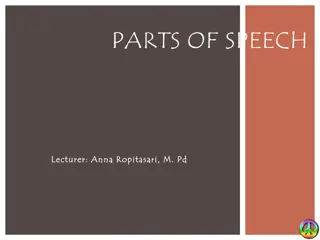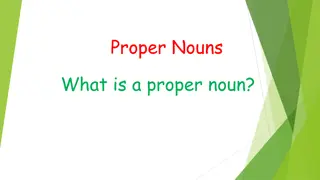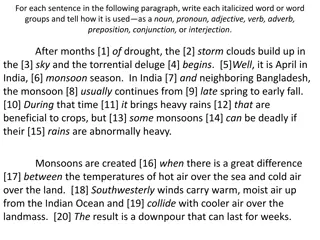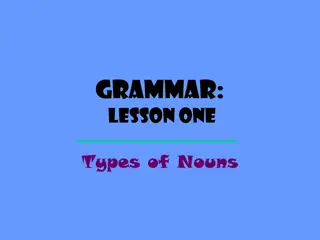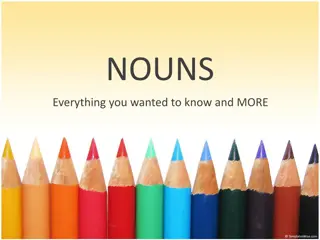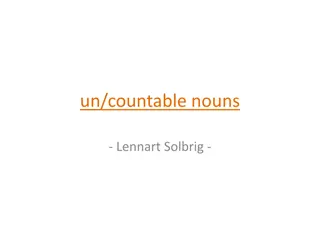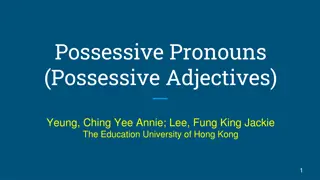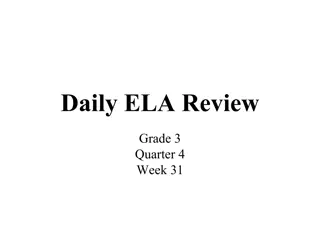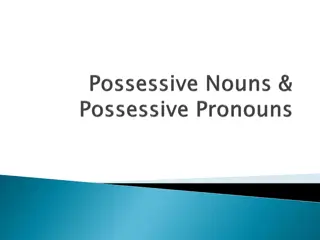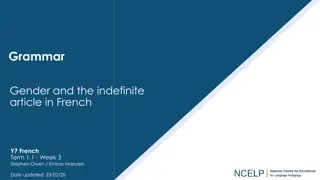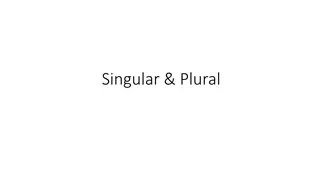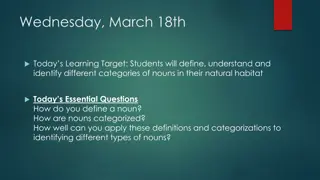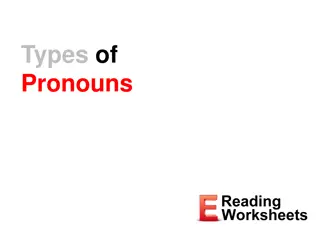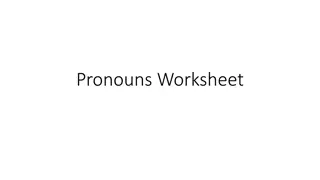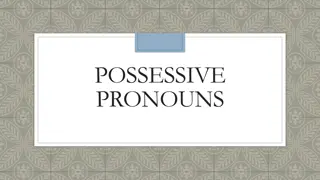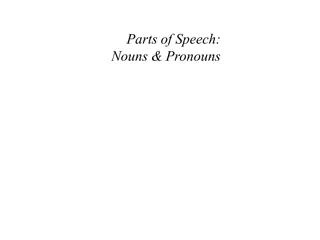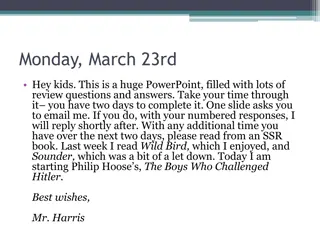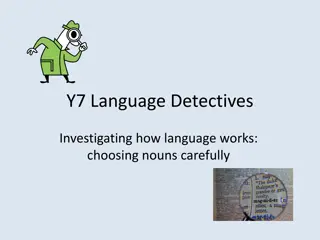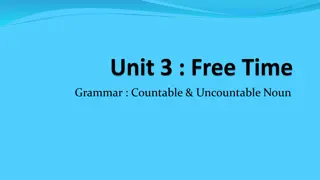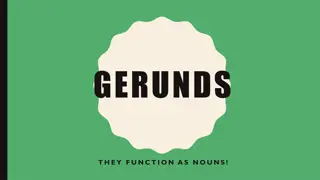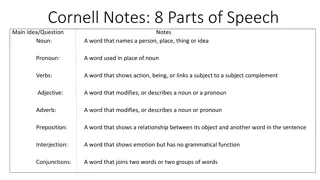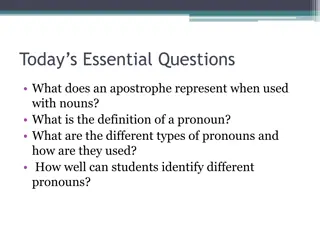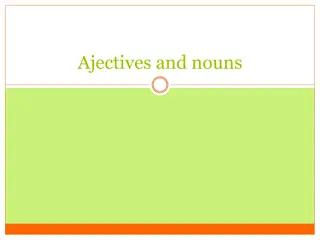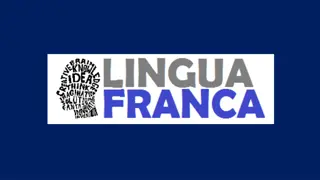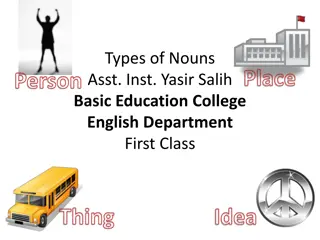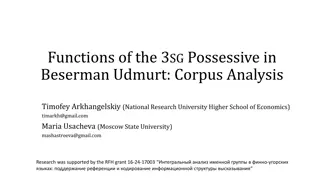Understanding Parts of Speech: Nouns and Pronouns Overview
Dive into the world of nouns and pronouns with this detailed guide covering definitions, examples, and practice exercises on common nouns, proper nouns, and different types of pronouns such as personal, demonstrative, and interrogative pronouns.
1 views • 19 slides
Understanding Adjectivals in Noun Phrases: A Comprehensive Guide
Adjectivals, including determiners, adjectives, and nouns, play crucial roles in modifying nouns within noun phrases. This guide explores the different types of adjectivals, their positions within a phrase, the use of pre-headword modifiers such as determiners, and the order of adjectives and nouns.
1 views • 40 slides
Understanding Proper Nouns: Names of People, Places, and Things
Proper nouns are special nouns that specify particular people, animals, or places. They always start with a capital letter and help identify specific entities. Examples include names of individuals such as Sami, Carol, or Elliot, as well as places like the National Orthodox School. Recognizing and c
0 views • 5 slides
Understanding Nouns: Types and Examples
This content delves into the different types of nouns, such as common and proper nouns, concrete and abstract nouns. It also provides examples and explanations on how nouns can be used in sentences. Gain insights on nouns as you explore this informative piece.
0 views • 24 slides
Understanding Types of Nouns: Common, Proper, Concrete, and Abstract
This educational content delves into the different types of nouns, including common nouns that refer to general entities, proper nouns that denote specific names, concrete nouns that are tangible, and abstract nouns representing intangible ideas. Explore examples and classifications to enhance your
0 views • 14 slides
All About Nouns: Types, Rules, and Examples
Explore the world of nouns - words that name people, places, things, or ideas. Learn about singular/plural, common/proper, concrete/abstract nouns, possessive/collective nouns, and rules for making singular nouns plural with helpful examples.
1 views • 22 slides
Understanding Nouns and Abstract Nouns: Identification and Formation
Explore the world of nouns, including proper nouns and collective nouns. Learn to identify and correctly write proper nouns and match collective nouns with their respective groups. Discover abstract nouns and how to create them by adding "-ness" to words. Enhance your writing skills with these funda
0 views • 107 slides
Understanding Nouns: Types and Examples
Explore the concept of nouns, the basic building blocks of sentences, and learn about different categories such as common and proper nouns. Witness how nouns represent a wide range of things and enhance your communication skills by mastering various nouns in English.
0 views • 19 slides
Understanding Countable and Uncountable Nouns
Countable nouns have singular and plural forms and can be used with articles like "a" and "the," while uncountable nouns have only one form and cannot be quantified with numbers. Countable nouns can stand with numbers or articles, while uncountable nouns can be used with specific words like "some" o
0 views • 16 slides
Understanding Possessive Pronouns and Adjectives in Family Stories
Explore how possessive pronouns and possessive adjectives are used in family stories featuring the Yeung, Ching Yee Annie, Lee, Fung King Jackie, and Simpson families. Discover how pronouns replace repeated nouns to make storytelling more engaging and concise. Dive into narratives about family membe
0 views • 15 slides
Grammar Warm Ups Lessons 16-20: Parts of Speech - Nouns
Learn about nouns as parts of speech in Lessons 16-20 of the Grammar Warm Ups series. Explore the definition, examples, and identification of nouns, including common and proper nouns. Improve your grammar skills with exercises highlighting different types of nouns.
0 views • 11 slides
Daily ELA Review Grade 3 - Week 31 & Week 32 Activities
Engage your third-grade students with daily ELA review tasks for Week 31 & Week 32. Practice possessive pronouns, past tense, possessive nouns, verbs, adjectives, conjunctions, and more through interactive exercises.
0 views • 48 slides
Understanding Possessive Nouns and Pronouns in English Grammar
Explore the usage of possessive nouns and pronouns in English grammar through examples of singular and plural possessive forms. Learn how possessive pronouns replace possessive nouns to indicate ownership effectively in sentences. Enhance your understanding of forming possessive constructions and ap
0 views • 10 slides
Understanding Parts of Speech in English Language
This content delves into various aspects of parts of speech in the English language, covering sentences, phrases, and clauses. It discusses the use of adjectives, nouns, pronouns, verbs, adverbs, prepositions, conjunctions, and interjections, providing examples and explanations. Additionally, it exp
0 views • 33 slides
Understanding Countable and Uncountable Nouns
Learn the difference between countable and uncountable nouns, how to identify them, and when to use "a" or "an" with countable nouns. Discover examples of countable and uncountable nouns and how to ask about quantities. Improve your English grammar knowledge to enhance your writing skills.
0 views • 13 slides
Gender and the Indefinite Article in French
In French, nouns have genders (masculine or feminine) and are accompanied by definite articles (un or une) based on their gender. Learning the gender of nouns is essential as it cannot be guessed from the meaning or appearance. The indefinite article "a" is represented by un for masculine nouns and
0 views • 12 slides
Understanding Singular and Plural Nouns
Singular and plural nouns can sometimes be confusing, but this guide clears up common misconceptions. Learn when to use plural nouns for singular items, how certain nouns can be singular or plural, and when to use singular or plural verbs with specific nouns like sports teams or companies. Recognize
0 views • 9 slides
Understanding Singular, Plural, and Possessive Nouns
Explore the basics of singular, plural, and possessive nouns with examples and guidelines on forming and using them correctly. Enhance your writing skills and grasp the concept of noun variations effortlessly.
0 views • 13 slides
Understanding Nouns: Types, Examples, and Usage
Exploring the concept of nouns, this content covers the definition of a noun, classifications such as material, compound, proper, common, abstract, and collective nouns. It also includes exercises on filling in blanks with appropriate nouns and distinguishing proper nouns from common nouns with exam
0 views • 18 slides
Understanding Nouns: Definitions, Categorization, and Examples
Explore the world of nouns by defining, categorizing, and identifying different types such as common, proper, and abstract nouns. Enhance your understanding through examples and practice exercises. Uncover the essence of nouns as they represent people, places, things, and ideas.
0 views • 20 slides
Understanding Different Types of Pronouns
Learn about the seven types of pronouns - Personal, Possessive, Reflexive, Relative, Demonstrative, Indefinite, Interrogative. Personal pronouns replace nouns, possessive pronouns replace possessive nouns, reflexive pronouns refer back to the subject, relative pronouns introduce relative clauses, an
0 views • 16 slides
Understanding Pronouns: Complete Worksheet for Practice
This detailed worksheet provides comprehensive information on subject pronouns, object pronouns, possessive adjectives, possessive pronouns, and reflexive pronouns. It includes examples and exercises to help you understand and practice using pronouns correctly in sentences.
0 views • 15 slides
Understanding Possessive Pronouns and Their Usage
Possessive pronouns indicate ownership and possession, such as mine, yours, hers, and theirs. Learn more about possessive pronouns with examples and practice exercises to enhance your understanding. Discover how to identify possessive pronouns in sentences and improve your grammar skills.
0 views • 5 slides
Understanding Nouns and Pronouns in Grammar
Explore the concept of nouns and pronouns in grammar through examples and explanations. Learn about the different types of nouns, such as singular, plural, and collective nouns. Discover how compound nouns are formed and their usage in sentences.
0 views • 42 slides
Understanding Nouns and Pronouns in Grammar
Dive into the world of nouns and pronouns with this comprehensive guide. Learn about different types of nouns such as concrete, abstract, collective, and compound nouns. Explore the distinction between common and proper nouns. Discover the role of pronouns as words that substitute for nouns, includi
0 views • 7 slides
Nouns of II Declension in Latin Grammar
Learn about the nouns of the second declension in Latin grammar, including the different forms of masculine, feminine, and neuter nouns, along with exceptions and examples. Explore the system of endings, Greek nouns of the second declension, and suffixes used in this declension.
0 views • 21 slides
Understanding Countable and Uncountable Nouns
Countable nouns are items that can be counted individually, such as "bananas," while uncountable nouns, like "rice," cannot be counted in the same way. Learn how to use "how much" and "how many" for different types of nouns, and when to use "some" and "any" in sentences. Also, understand when to use
0 views • 20 slides
Comprehensive Review Questions on Verbs and Nouns
Explore a detailed PowerPoint presentation filled with review questions and answers on verbs and nouns. Take your time to go through the slides and engage with essential questions about different types of verbs and nouns. Enhance your understanding of abstract nouns, pronouns, and collective nouns w
0 views • 37 slides
Exploring the Use of Nouns in Fiction Writing
Investigating how writers use nouns to vividly describe characters and settings in fiction, this content delves into the impact of carefully chosen nouns in creating engaging narratives. Examples from well-known works like "Harry Potter" and "Poison" illustrate the importance of proper and common no
0 views • 7 slides
Understanding Plural and Possessive Forms in English
Learn the distinction between plural (-s) and possessive (-'s) forms in English nouns through examples and explanations. Discover how to form plurals, show possession, and distinguish between plural and possessive usage in sentences.
0 views • 8 slides
Understanding Countable and Uncountable Nouns in Grammar
Explore the differences between countable and uncountable nouns in grammar with examples. Learn how to form plural forms of countable nouns and understand the concept of uncountable nouns. Enhance your grammar skills by mastering the usage of articles and quantifiers with both types of nouns.
0 views • 80 slides
Understanding Nouns and Their Functions in Sentences
Gerunds function as nouns in sentences and can serve various roles such as subjects, direct objects, and predicate nouns. Nouns act as the subject of a sentence, telling who or what the sentence is about. By identifying the subject in sentences, you can understand its role and importance in conveyin
0 views • 22 slides
Understanding the 8 Parts of Speech in Grammar
Explore the essential components of language with Cornell Notes on the 8 parts of speech in grammar. Discover the roles of nouns, pronouns, verbs, adjectives, adverbs, prepositions, interjections, and conjunctions. Expand your knowledge on grammar levels, common and proper nouns, possessive pronouns
0 views • 6 slides
Understanding Parts of Speech in English Grammar with Dr. David Odoi
Dive into the fundamental aspects of English Grammar with Dr. David Odoi at the Language Centre. Explore Nouns, Pronouns, and Verbs while learning about the different types of nouns such as Proper, Common, Collective, Concrete, and Abstract nouns. Understand countable and uncountable nouns and their
0 views • 37 slides
Understanding Apostrophes and Pronouns in Grammar
Apostrophes are used to show ownership with nouns, while pronouns replace nouns in sentences. Learn the rules for apostrophe usage and different forms of pronouns including subject, object, and possessive pronouns. Practice identifying and using pronouns effectively in various sentence structures.
0 views • 15 slides
Understanding Adjectives and Nouns: Gender, Form, and Declension
Learn how to connect nouns with adjectives by considering gender, form, and declension. Understand the importance of matching genders and cases, and practice with examples. Explore paradigms for different adjectives and nouns, declining them accordingly. Enhance your language skills in forming corre
0 views • 12 slides
Understanding Nouns in English Language
Nouns are words used to refer to people, animals, objects, substances, events, ideas, and feelings. This includes proper nouns which name specific entities and common nouns that represent general terms. Additionally, collective nouns denote groups of entities. Examples such as Ruma, Sopna, Dhaka, Lo
0 views • 16 slides
Understanding Pronouns: Types and Usage
Pronouns are vital elements in language that replace nouns to avoid repetition and make sentences concise. They include personal, possessive, reflexive, intensive, indefinite, demonstrative, relative, interrogative, and reciprocal pronouns. Personal pronouns serve as subjects (e.g., I, he, she) or o
0 views • 18 slides
Understanding Different Types of Nouns in English Language
Explore the diverse world of nouns, including common vs. proper nouns, concrete vs. abstract nouns, and human vs. non-human nouns. Learn how to differentiate between them and understand their unique characteristics through visual examples and explanations.
0 views • 14 slides
Analysis of 3SG Possessive Functions in Beserman Udmurt Corpus
Beserman Udmurt's 3SG possessive holds significance beyond typical possessive relations, often serving non-possessive functions like marking contrastive focus. This study delves into the diverse functions of the 3SG possessive in Udmurt through corpus analysis, exploring its evolution into a definit
0 views • 35 slides
